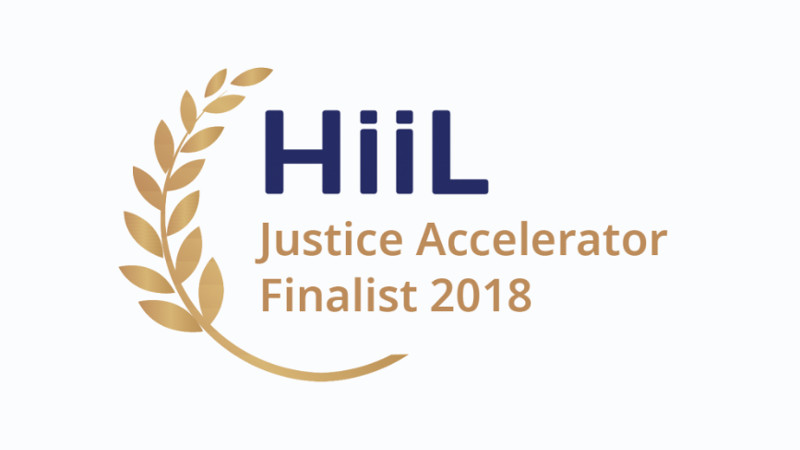A total of 33 African justice innovators and legaltech startups have made it into the final round of the 2018 edition of the Hague Institute for Innovation of Law’s (HiiL) Innovating Justice Challenge.
The Hill Justice Accelerator (HJA), which runs the challenge, announced the finalists in a blog post earlier this month.
No ad to show here.
The accelerator stated that finalists were selected based on their impact, scalability, sustainability, uniqueness, and team. HJA also considered feasibility, social impact and institutional roadblocks facing applicants.
The 33 finalists are from Benin, Ghana, Kenya, Nigeria, Rwanda, Sierra Leone, South Africa, Tanzania, Uganda, and Zimbabwe
The 33, along with other finalists from Bangladesh, India, Myanmar, the Netherlands and Ukraine, will attend local pitch and training events in September. The African finalists hail from 10 countries: Benin, Ghana, Kenya, Rwanda, Sierra Leone, South Africa, Tanzania, Zimbabwe, and Uganda which leads the continent with 10 selected innovations.
Benin
HeLawyer: A mobile app specialising in legal advice. HeLawyer provides citizens with round the clock legal information and advice.
Ghana
Kompliance: This small business registration platform allows companies to create and manage their legal documentation as well as have access to legal services at a lower cost.
Kenya
Btrack Global: Btrack Global has developed tracking devices that enable motorcycle owners to easily track their motorcycles on their mobile phones in the event of theft.
Loyasoft: A platform which provides startups with access to vetted lawyers and template documents, enabling them to solve legal issues at a subsidised cost.
Uliza Wakili: A collection of lawyers, arbitrators and mediators who provide small businesses and startups with cheap means of alternative dispute resolution.
Wakili Mkononi: This social enterprise offers legal aid services and legal networking services through its digital platform.
WASILIANAHUB: A collaborative online and mobile tech-justice marketplace building Africa’s largest certified professional mediator’s portal.
iCourtroom: This repository of wildlife crime data was designed to provide a quicker, more effective and efficient way of data entry and analysis of wildlife crimes. The platform also serves as a measure of law enforcement efficacy.
Nigeria
In4Justice: This startup aims to provide speedy and easily accessible settlement of small claims disputes.
FarmworkerzApp: A digital platform that seeks to connect vetted farm-hands to potential farms for hiring anytime, anywhere to eliminate conflict between workers and farm owners.
Legal Support LITE: A USSD and interactive voice response based solution that provides free, efficient and custom made legal advice to small businesses.
Gavel: This civic tech startup aims to improve the pace of justice delivery through tech. Gavel does this by tracking criminal cases, and police brutality complaints. In addition, users are also connected to free legal aid lawyers through the platform.
NoMore (nomore.ng): Through this app, females students at Nigerian university campuses will be able to securely report cases of sexual harassment, rape or abuse.
Rwanda
Viamo: This social enterprise is developing information on access to justice that will be made available on demand in pre-recorded audio and text, on a toll-free mobile service under the shortcode 845, supported by MTN.
Sierra Leone
CrimeSync: An all-in-one digital crime records management application which serves to improve judicial service delivery through the whole justice chain.
South Africa
Epoq Legal: Legal document service that provides real-time assistance and guidance around the creation of legal documents used by businesses.
Boabob: This platform enables lawyers to create engaging video-based tutorials, to empower people to resolve many of their own legal issues.
Masenze Strategic Advisors: Masenze Strategic Advisors provides convenient, relevant and affordable education and information with respect to awareness of basic socio-economic rights to enable self-representation by the vulnerable and marginalised
Buyisa Soul and Spiritual Centre: Based on a mediation court in Alexandra township, Johannesburg — which is convened by traditional healers — this centre aims to replicate this process to provide additional access to justice.
Portable Lawyer: This startup allows for easy, affordable access to more than 30 critical contracts, real-time on demand legal support, digital signatures, contract management and data protection compliant.
Tanzania
Nusu Hub: A marketplace that enables people from low income and rural areas to hire legal professionals, all of whom are pre-screened and vetted.
Uganda
Bataka Court Model: This community based informal justice model provides an alternative justice mechanism to enhance access to justice for the poor.
Tunga Innovations: An app that informs users about their employment rights.
Yunga: This local rescue digital network was designed to allow neighbours to communicate with each other in real time in the event of an attack.
Via: A conversational legal voice assistant, that utilises artificial intelligence to give legal information on the go as well as recommend a lawyer.
BitShelter: An interactive system that disseminates, shares, and displays legal information including images, video, text, and audio in real time.
JusticeBot: This chatbot provides users in need of legal services with access to legal procedures, information and services.
LegIT: A self-service platform that enables small businesses to generate legal documents conveniently, efficiently and affordably in three easy steps.
Prison Officer Legal Empowerment (POLE) Model: POLE empowers prison communities and the poor with legal education. It aims to be incorporated into the training curriculum of prisons.
Zzimba Games (ZG): ZG is simplifying the justice ecosystem by simulating Ugandans experience through an entertaining card and board game that mirrors their environment and subsequently empowers them with knowledge of the country’s legal system.
Muchomo Moments: This company uses videos to break down the law to the masses in relatable languages, through local video shacks.
Zimbabwe
PhoenixCMS: Phoenix Case Management System is a computerised platform that enhances justice organisations’ case intake, tracking, resolution of reported cases, multi-sectoral coordination and data analysis.
IPassist-zw: A web-based platform that enables startups and other small businesses to access effective and affordable intellectual property services from a pool of experts and lawyers.
